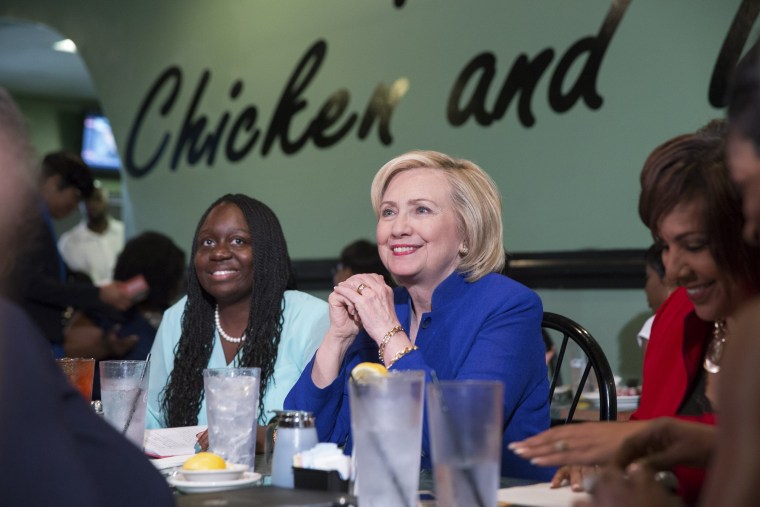When Hillary Clinton gives a speech in Houston on Thursday at a historically-black college calling for 20 days of early voting in every state, she will be reemphasizing her long-held commitment to defending the voting rights of minorities.
She will also be appealing to some of her strongest supporters: non-white Democrats.
In the early stages of the Democratic primary race, one of Clinton’s rivals, Vermont Sen. Bernie Sanders, has drawn huge crowds and surged in polls, although he remains well-behind the former secretary of state.
Sanders appears to have been benefited from the much-discussed divide between traditional Democrats like Clinton and those who are more liberal on economic issues like Massachusetts Sen. Elizabeth Warren.
But another divide has emerged that favors Clinton: white versus non-white Democrats. In a new Washington Post/ABC News survey, 56 percent of white Democrats backed Clinton, while 14 percent supported Sanders. Among self-described liberals, Sanders had 17 percent support, compared to 63 percent for Clinton. (Vice President Biden, who has given no indication he will run, polled in double-digits among both groups.)
But among non-white Democrats (the survey did not break them down by ethnicity), Clinton had 72 percent support, compared to 5 percent for the Vermont senator.
This finding mirrors that of other surveys. As Dante Chinni wrote last week, Wall Street Journal/NBC News polling shows that 68 percent of non-white Democrats say Clinton does not need a primary challenger, while the majority of white Democrats (53 percent) want her to face other candidates.
Among white Democrats, 56 percent say Clinton will bring “real change,” compared to a whopping 81 percent of non-white Democrats, according to the WSJ/NBC survey. A CNN poll showed Sanders with 14 percent of the white vote, compared to 5 percent among non-white Democrats.
A Pew poll in March, before Clinton formally started her campaign, showed that 74 percent of black Democrats said there was a "good chance" they would back the former first lady. Only 54 percent of white Democrats agreed with that statement, with many of them (34 percent) opting with the less enthusiastic "some chance."
Sanders disproportionate support among whites and liberals is an advantage early in the primary process because it starts in Iowa and New Hampshire, two overwhelmingly-white states. In Iowa, 93 percent of the Democratic electorate was white in 2008.
And caucuses in particular reward the kind of intense supporters who are drawn to a candidate like Sanders.
But he will need to vastly expand his base to become a true challenger to Clinton. More than 40% of the people who voted for Obama in 2012 were ethnic minorities. Blacks may be the majority of voters in some Democratic primaries in the South, as they were in 2008.
For Clinton, barring the entrance of a candidate who would have more appeal to minority voters (First Lady Michelle Obama would be very strong with blacks and Biden would be more formidable than Sanders), this advantage among non-white voters provides a kind of security blanket for her in the primary.
But the former secretary of state is likely to keep courting non-white voters, in part to prepare for the general election, where maintaining Obama’s huge advantage among minority voters is a virtual requirement for winning.
While Clinton has said little to address economic liberals in her first few weeks as a candidate, she has strongly emphasized her commitment to creating a pathway to citizenship for undocumented immigrants and reforming America’s criminal justice system, issues that are strong priorities for black and Hispanic activists.
Clinton has a long-standing and ardent opposition to some of the voting provisions adopted recently by GOP governors and state legislatures, such as limits on same-day registration and requirements to present a photo ID to cast a ballot. In one of her first political speeches after leaving the State Department in 2013, Clinton called a North Carolina law, “the greatest hits of voter suppression.”
She is expected to use similar language on Thursday, as well as calling for Congress to write a new version of the Voting Rights Act, after one of its core planks was struck down two years ago by the Supreme Court.
